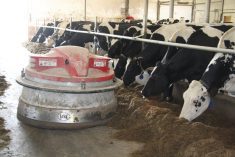PIGEON LAKE, Alta. – When Sharon Caswell went back to the land 20 years ago, she didn’t see herself in a home business that would take over her life.
Working with four other farmers, Caswell sells frozen meat packages to families and restaurants from Calgary to Fort McMurray, Alta. She raises lamb and pastured poultry on her farm.
Her frozen lamb, pork, beef and chicken packages are farm fresh and free of hormones and antibiotics. The packages contain a variety of cuts.
“It’s growing faster than I want it to,” she said.
Read Also

Manitoba extends Crown land rent freeze
Manitoba government links the continued rental rate freeze on grazing and forage leases to economic and environmental challenges facing the industry
Her company, Country Natural Foods, has reached the point where she must decide whether to expand and hire staff or continue working alone on her farm near Rimbey, Alta.
She isn’t sure if she wants employees because she has seen other businesses grow larger and lose the spark that made them special.
Most of her customers are from the city with a taste for natural products from well-run, clean farms where the animals don’t receive growth-promoting hormones or antibiotics for disease prevention.
Besides individual customers, she provides lamb to Community Natural Foods, an organic grocer in Calgary.
“I always thought it would work. Urban people are losing their connection with where their food comes from. People want to feel like they’re buying from the farmers.”
Ultimately, Caswell wants to offer tours to urban people and chefs to show them where and how food is produced.
She also tries to keep costs down and sometimes wonders if she is being fair to herself by not charging more.
“I want people to be able to afford it. When you have your own business you work 24 hours a day at it. How do you value that?”
Inspections required
She has found restaurants value what she does because they tell her they want locally produced food but don’t always have the connections to buy from farmers. Food like meat and eggs must be government inspected and restaurants need assurances that everything came from a clean environment.
So far, Caswell has built trust among her customers by providing safe, consistent quality meat.
“Running my own business is about honesty and integrity. I can’t take any chances,” she said over coffee at the Eco Cafe owned by Tim and Debbie Wood.
Edmonton transplants, Tim was a cooking instructor at the Northern Alberta Institute of Technology. He owned a restaurant in the 1980s and swore he wouldn’t do it again.
He and Debbie moved to Pigeon Lake in May 1998 and have found a special place in the community with their sun-filled restaurant.
Pigeon Lake is a cottage community encircled by mixed farms south of Edmonton. Their first year in business was slow but now they serve three meals a day to loggers, farm families and tourists. Lunch times are so busy they turn people away.
Everything at the restaurant is made from scratch from fresh, locally grown products. Sometimes those foods are hard to find.
At his first restaurant in Edmonton, Wood shopped at farmers’ markets but couldn’t get enough volume. The problem is partly with the farmers themselves. Their food quality is excellent but they have often failed with their marketing.
“There are a growing number of people who are planting things like strawberries and saskatoons. They don’t have their market. They plant it and then try to find a market,” said Wood. “They figure if they grow it, somebody will buy it.”
Any restaurant will buy the fruit but Wood suggests the farmers find a broker or a person like Caswell to help sell it.
“Sharon can go to the farm, talk to the people and tell me whether it is a clean farm, whether the people care about what they are doing. Then I feel safe and know what I am getting is good,” he said.
Wood also needs a dependable supply every week.
Working in a farm community has been a learning experience. First he had to bring his menu in line with a rural clientele.
“We had to rethink what we were doing. We were far above food-wise what these people were used to. We had to localize it.”
He found women were the first to try new foods and little by little the menu became more eclectic, offering meat loaf as well as hummus.
He can only go so far with variety. If customers won’t buy it, he won’t put it on the menu. He has to calculate the cost per plate and if he has to spend a lot on meat, he raises the price of the entree. Local people won’t spend beyond a certain amount.
“I have to stay away from the high-end stuff. I can’t charge enough. We don’t have the base clientele that would pay for me to serve venison or ostrich,” he said.















